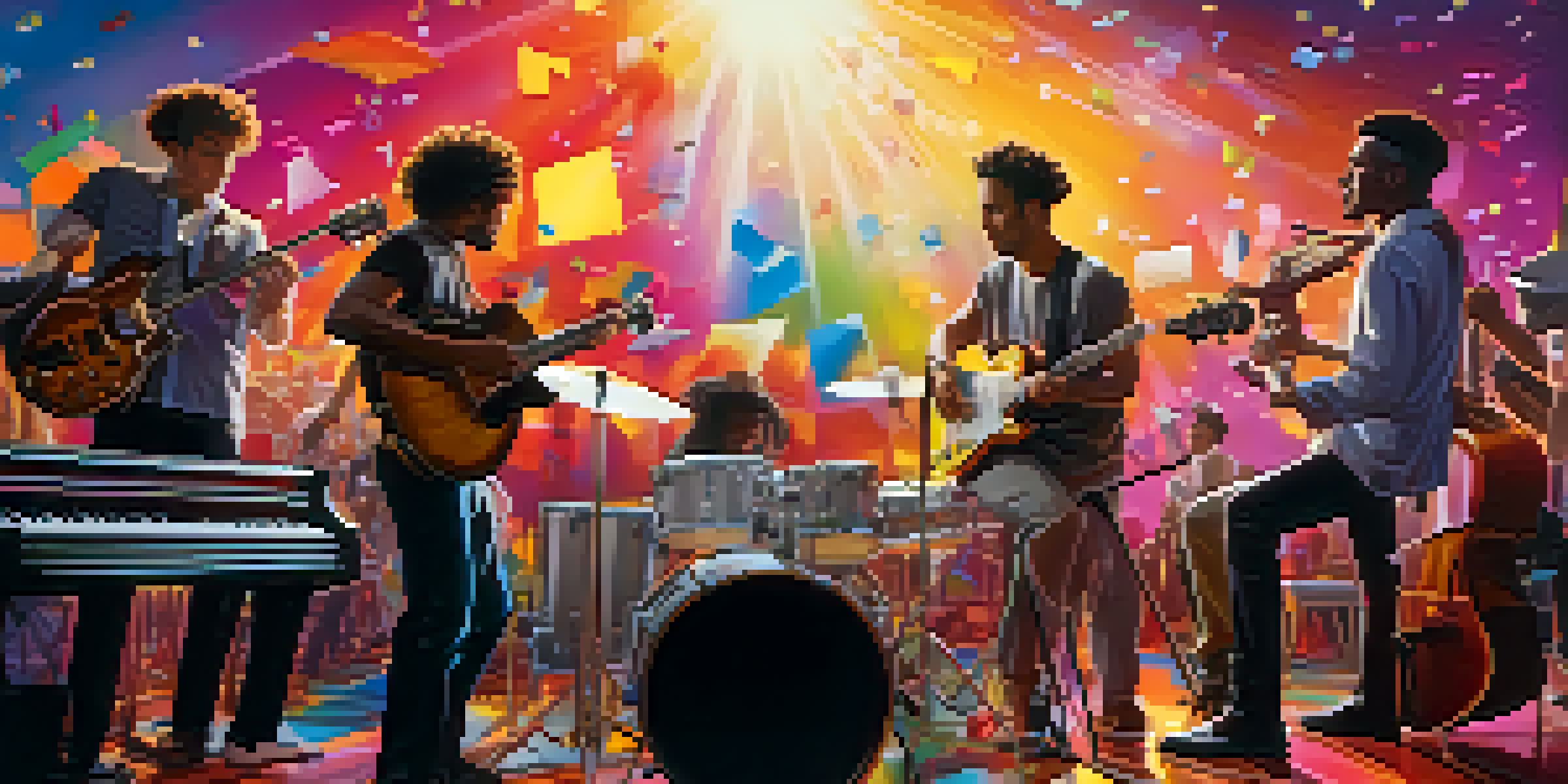The Role of Film Soundtracks in Boosting Artist Popularity

Understanding the Power of Film Soundtracks
Film soundtracks are more than just background music; they are vital storytelling tools that enhance the emotional experience of a movie. When a song is perfectly timed with a scene, it can evoke feelings that linger long after the credits roll. This emotional connection often leads audiences to seek out the music, introducing them to artists they may not have discovered otherwise.
Music can change the world because it can change people.
Take, for example, the use of 'Shallow' by Lady Gaga and Bradley Cooper in 'A Star is Born.' The song not only garnered critical acclaim, but it also skyrocketed the artists' visibility, reaching listeners who may not typically tune into their genre. This illustrates how soundtracks can serve as a launchpad for an artist's career, creating a ripple effect of popularity.
Moreover, the integration of songs into film can create a lasting association between the music and the movie's themes. When viewers hear a track later, it can invoke memories of the film, further embedding the artist's work into popular culture.
How Chart-Topping Soundtracks Drive Sales
A successful film soundtrack can significantly boost an artist's record sales. When a song becomes part of a blockbuster, it often climbs the charts, leading to increased streaming and sales. This phenomenon is not just a coincidence; it's a well-documented trend in the music industry.

For instance, the 'Frozen' soundtrack, featuring 'Let It Go,' transformed Idina Menzel into a household name. The song's impact was so profound that it became synonymous with the film, showcasing how soundtracks can elevate an artist's profile overnight. It's a classic example of how one song can give an artist the exposure they need to reach a wider audience.
Soundtracks Enhance Emotional Impact
Film soundtracks serve as powerful storytelling tools that deepen the emotional experience for audiences.
In addition, when songs featured in films become popular, they create an opportunity for cross-promotion. Fans of the movie are likely to explore the soundtrack, leading to an increase in the artist's fanbase and further driving sales.
The Role of Social Media in Amplifying Soundtrack Success
In today's digital age, social media plays a crucial role in amplifying the success of film soundtracks. Platforms like TikTok and Instagram allow users to share snippets of songs from movies, creating viral moments that can catapult an artist's popularity. This trend has led to a new way for artists to connect with fans and promote their music.
The power of music makes all the difference in the world.
Take the example of 'Blinding Lights' by The Weeknd; snippets of the song were used in countless TikTok dance challenges, which not only revitalized interest in the song but also made it a cultural phenomenon. When a song from a film or its soundtrack goes viral on social media, it can lead to increased streaming numbers and fan engagement, proving that soundtracks can thrive beyond the silver screen.
Furthermore, social media allows artists to share behind-the-scenes content or personal stories related to their music and its inclusion in films. This connection fosters a sense of community and loyalty among fans, ultimately boosting the artist's popularity.
Cross-Genre Collaborations in Film Soundtracks
Film soundtracks often bring together artists from diverse genres, creating unique collaborations that can attract a wider audience. These cross-genre partnerships can introduce fans to new musical styles and artists they might not typically listen to. For example, when pop artists collaborate with hip-hop or indie musicians for a soundtrack, it can create a rich tapestry of sound that appeals to various demographics.
A notable example is the 'Black Panther' soundtrack, which featured artists like Kendrick Lamar and SZA alongside iconic musicians. This blend not only showcased their individual talents but also highlighted the versatility of the soundtrack. Such collaborations can lead to chart-topping hits and significant exposure for all artists involved.
Social Media Boosts Music Popularity
Platforms like TikTok amplify the success of film soundtracks, allowing songs to go viral and reach wider audiences.
Moreover, these collaborations can help break down genre barriers, encouraging listeners to explore music outside their usual preferences. This phenomenon illustrates how soundtracks can serve as a melting pot for musical talent, ultimately benefiting all artists involved.
The Lasting Impact of Iconic Film Songs
Certain songs associated with films become iconic, often defining both the film and the artist's career. Think of 'My Heart Will Go On' by Celine Dion from 'Titanic'—the song not only topped charts worldwide but also became synonymous with the film itself. Such associations can create a timeless legacy for both the artist and the movie.
These iconic songs often have a way of resurfacing in pop culture, whether through remixes, covers, or nostalgic references. This continual presence keeps the artist in the public eye, making it easier for them to launch new projects and maintain relevance in a fast-paced industry.
In essence, a well-placed film song can become a cultural touchstone, ensuring that an artist's work is remembered and celebrated long after its initial release. This lasting impact underscores the importance of soundtracks in shaping both the film and music industries.
The Business Side: Licensing and Revenue Opportunities
The financial benefits of having music featured in films extend beyond just increased sales and streaming. Licensing agreements can provide artists with significant revenue, allowing them to earn money each time their song is played in a movie or used in promotional materials. This additional income stream can be a game-changer for emerging artists trying to establish themselves in the industry.
Moreover, soundtracks can open doors for artists to negotiate better deals with record labels and other platforms. When a song gains traction through a film, it strengthens the artist's bargaining position, leading to more favorable contracts and increased visibility in the industry.
Licensing Drives Revenue for Artists
Having music featured in films creates lucrative licensing opportunities, providing artists with significant additional income.
Ultimately, the business side of film soundtracks showcases the symbiotic relationship between artists and filmmakers. By collaborating effectively, both parties can reap substantial rewards, creating a win-win scenario that boosts the popularity of the artist and enhances the film's appeal.
Conclusion: The Multifaceted Role of Soundtracks
In conclusion, film soundtracks play a multifaceted role in boosting an artist's popularity. From introducing new audiences to creating iconic songs, the impact is profound and far-reaching. By leveraging the emotional connection that soundtracks foster, artists can significantly enhance their visibility and reach.
As we’ve seen through various examples and trends, the relationship between film and music is increasingly symbiotic. Artists have the opportunity to collaborate across genres, engage with fans on social media, and capitalize on licensing opportunities to build lasting careers.

Ultimately, the magic of film soundtracks lies in their ability to weave music into the fabric of storytelling, creating memorable experiences that resonate with audiences and elevate artists to new heights.